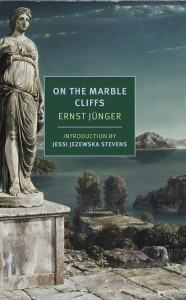 Ernst Jünger’s On Marble Cliffs is a fascinating little book. It is a fantasy, detailing an ancient society and a man named Otho living through peculiar experiences and changes that occur. A number of parallels exist to real world authoritarian populist movements, and the decisions of the family to attempt to withdraw from society and instead keep to themselves in intellectual persuit. Even as they do this those around them seem increasingly influenced by warlike individuals, and the overall threat to their own attempts at isolation.
Ernst Jünger’s On Marble Cliffs is a fascinating little book. It is a fantasy, detailing an ancient society and a man named Otho living through peculiar experiences and changes that occur. A number of parallels exist to real world authoritarian populist movements, and the decisions of the family to attempt to withdraw from society and instead keep to themselves in intellectual persuit. Even as they do this those around them seem increasingly influenced by warlike individuals, and the overall threat to their own attempts at isolation.
There are a number of well thought out powerful statements scattered in the book which make almost more of an impression than the plot ever could.”In hours of weakness, destruction takes on a terrible aspecy, like the image one sees in the temples of vengeful deities” on page 57 serves as one such example, and the fact that it is said by someone regretfully looking back on the events helps to give it some weight.
Seeing a society breakdown due to the worst sort of populism is a major part of this story, one that while Timeless is nonetheless very much important in relation to the book’s historical status. This volume was originally published in 1939, with the blessing of Adolf Hitler himself before being suppressed a couple years later on the orders of the SS due to its anti-nazi leanings. The ability of a powerful fascist regime to miss potential criticism in a text is nothing new, however it can add a layer to reading it when one realizes such things.
Realizing them will depend alternatingly on the readers pre-existing knowledge and what material is provided along with the book. If an English language reader wants to make their way through this book, it absolutely has to be this edition. Never mind the question of previous English language variance existing, this translation is easy and naturalistic to read without ever seeming at odds with the somewhat bespoke style that the author uses. Furthermore the introduction and afterward each provide fascinating details in their own right about the author, his times, and this particular book. For instance his complicated relationship with the Nazi regime while he lived under it, which could be seen as an excuse to condemn him utterly or a proof he is a surprising Link in the chain of resistance depending upon how one interprets it. All of these facts on their own would make him an interesting figure, but in light of the subject matter of the book they become all the more fascinating.
Quality aside, and in spite of the similar if nationalistically diverged backgrounds of the authors, Jünger’s fantasy is the anti- Tolkien. The story is told briefly, extremely short and largely inward looking. It is fatalistic and treat different humans as less understandable and characterful then Tolkien would treat orcs. In all it is a short, well written, and delightfully frustrating book. While obvious allegories and parallels exist throughout, the strange position solutions will leave many readers confused or frustrated. This is not due to a lack of quality, but instead because the incomplete moralizations and often distant tone will be odd compared to more modern texts dealing with such material. For a reader who wishes to look at an unusual piece, and an excellent example of the darkness under the worst types of leadership, it is a fascinating piece that can readily be recommended. To curious parties, it’s short length and fairly extensive background material makes it well worth a try.
( nyrb classics 2023)
